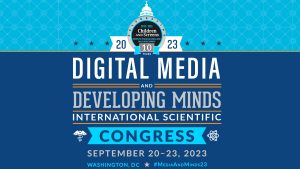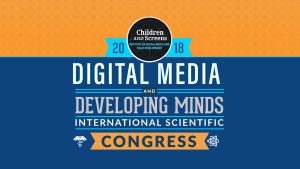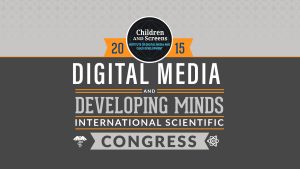View a daily breakdown of Congress sessions below. A downloadable program and abstract PDF are available.
**Watch snapshots from Sunday’s sessions.**
Mentorship Program “Meet and Greet”
4:00 pm – 5:00 pm (Sponsored by Common Sense Media)
🎥 Welcome and Opening Remarks
5:00 pm – 5:20 pm
- Kris Perry, Executive Director, Children and Screens: Institute of Digital Media and Child Development
Brief and Brilliant Talks
5:20 pm – 5:40 pm
- Kyra Dingle, Medical Student, University of Irvine School of Medicine, “The Role of Youth as Experts in Improving the Effectiveness of Digital Media Literacy Interventions”
- Jing Chen, MA, PhD Student, Department of Human Development and Family Science, Virginia Tech, “The Interplay Between Problematic Smartphone Use, Depression, and Creative Personality in Adolescents: A Longitudinal Cross-Lagged Model”
- Destinee Ramos, Undergraduate Student, Harvard College and Center for Digital Thriving, “Physiological Responses to Social Media Detox: A Randomized Control Study With, By, and For Teen Girls”
- Lilach Graff Nomkin, MA, Research Psychologist, Doctoral Candidate in Psychology, Bar-Ilan University, “The SMaRT Mom Intervention – Partial Abstinence Alters Neural Processing in Parietal Regions of Breastfeeding Mothers with Excessive Smartphone Use to Smartphone Cues – Initial Results of an ERP Study”
- Gretchen Peters, MA, Executive Director, Alliance to Counter Crime Online; Advisory Board Member, SOMI (Stichting Onderzoek Marktinformatie / Foundation for Market Information Research), “Hiding in Plain Sight: Instagram Violates the DSA by Serving as a Gateway for a Vast Network of Pedophiles”
🎥 (Invited Panel) Legislation and Litigation: Approaches to Accountability for Social Media
5:40 pm – 6:40 pm
This panel shared insights learned from leading voices trying to mitigate, moderate, and remediate the potential harms that social media poses to today’s youth, through legislation and litigation approaches. Panelists discussed how different strategies intersect with scientific evidence, as well as what is still needed from the field to support evidence-based approaches to regulation.
- Kris Perry (Moderator), Executive Director, Children and Screens: Institute of Digital Media and Child Development
- Alix Fraser, Vice President of Advocacy, Issue One
- Imran Ahmed, CEO & Founder, Center for Countering Digital Hate
- Gretchen Peters, MA, Executive Director, Alliance to Counter Crime Online; Advisory Board Member, SOMI (Stichting Onderzoek Marktinformatie / Foundation for Market Information Research)
🎥 Fireside Chat with the Chair of the Federal Trade Commission
6:40 pm-7:00 pm
- Andrew N. Ferguson, JD, Chairman, Federal Trade Commission
- Dimitri Christakis, MD, MPH, Chief Science Officer, Children and Screens: Institute of Digital Media and Child Development; George Adkins Professor of Pediatrics, University of Washington; Chief Health Officer, Special Olympics International
Welcome Reception
7:00 pm – 8:00 pm
**Watch snapshots from Monday’s sessions.**
Welcome and Brief and Brilliant Flash Talks
8:30 am – 8:40 am
- Caroline Fitzpatrick, PhD, Associate Professor, Université de Sherbrooke, “Associations between Postsecondary Students’ Lifestyle Habits and Positive Mental Health: A Gender-Based Analysis”
- Luka Todorović, MSc, PhD Candidate, Developmental Psychology, University of Amsterdam, “Bidirectional Associations of Problematic Social Media Use and Problematic Gaming with Mental Health Difficulties and Strengths in Adolescents: Sex and Social Support as Potential Moderators”
🎥 (Invited Panel) Brain Development in a Digital World
8:45 am – 9:45 am
How do young brains respond to digital media — and how does it affect critical periods of development in early childhood and adolescence? In this session, panelists reviewed the foundations of brain development, focusing on the rapid development that occurs during the first years of life and again during adolescence, how we study the brain and its activities, and what we know (or have yet to uncover) about intersections with digital media use throughout childhood.
- Heather Kirkorian, PhD (Moderator), Laura M. Secord Chair in Early Childhood Development, Professor and Chair, Development of Human Development and Family Studies, University of Wisconsin-Madison
- Tzipi Horowitz-Kraus, PhD, Associate Professor, Faculty of Education in Science and Technology, Faculty of Biomedical Engineering, Technion-Israel Institute of Technology Haifa, Israel; Associate Professor, Neuropsychology Department, Kennedy Krieger Institute Baltimore, Maryland
- Lucía Magis-Weinberg, MD, PhD, Assistant Professor, Department of Psychology, University of Washington
🎥 (Invited Panel) Teen Mental Health: The Double-Edged Sword of Social Media
9:45 am – 10:45 am
This panel will explore the relationship between teen social media use and mental health. Panelists will include a child and adolescent psychiatrist with clinical and research expertise in helping youth and families manage risky online behaviors, a research psychologist who studies sociocultural and technological influences on adolescent development and a youth advocate for healthier screen use. The panel will discuss both positive and negative outcomes related to youth social media use and highlight potential differences for youth based on individual risk and identity factors. They will provide ideas and future directions for researchers, clinicians and educators working with youth.
- Erin L. Belfort, MD, DFAACP (Moderator), Associate Professor of Psychiatry, Tufts University School of Medicine
- Meredith Gansner, MD, Child and Adolescent Psychiatrist and Assistant Professor, University of Rochester Medical Center
- Anne (Annie) Maheux, PhD, Assistant Professor & Winston Distinguished Fellow, University of North Carolina at Chapel Hill, Winston Center on Technology and the Developing Mind
- Ben Forman, Honors Medical Engineering Student, University of Colorado
Break | Tools and Methodologies Spotlights
10:45 am – 11:15 am
- AAP Center of Excellence
- Biopac/fNIR Devices
- Child Mind Institute
- imec-mic-UGent
🎥 (Invited Panel) Cyber Risks and Violence: Understanding Child Safety Online
11:15 am -12:15 pm
This panel will address risk, aggression, and violence online across platforms, examining how individual and group inequities shape exposure to harm. Dr. Brendesha Tynes (USC), Dr. Ran Barzilay (CHOP), and Amanda Sanchez (Culture Reframed) will explore the intersections of racism, misogyny, and bias in shaping digital experiences for youth. Grounded in research and clinical practice, the conversation will highlight the psychological, developmental, and social impacts of online violence, with a focus on intervention and prevention. This session will offer critical insights for those working to build safer, more equitable digital environments for youth.
- Desmond Upton Patton, PhD, MSW (Moderator), Schwartz University Professor / PIK University Professor, University of Pennsylvania
- Mandy Sanchez, PhD, Director of Programming, Culture Reframed
- Ran Barzilay, MD, PhD, Assistant Professor of Psychiatry, University of Pennsylvania Perelman School of Medicine; Attending Child and Adolescent Psychiatrist, Children’s Hospital of Philadelphia Department of Child and Adolescent Psychiatry and Behavioral Sciences (did not attend)
- Brendesha Tynes, PhD, Professor of Education and Psychology, University of Southern California Center for Empowered Learning and Development with Technology
🎥 Special Remarks
12:15 pm – 12:25 pm
- Matthew Bergman, JD, Founding Attorney, Social Media Victims Law Center; Professor, Lewis and Clark Law School (did not participate)
Lunch
12:15 pm – 1:30 pm (Sponsored by Waltons Trust and Center for Media, Technology and Democracy)
🎥 (Invited Panel) Spirits in the Material World: Physical Health and Digital Media Use
1:30 pm – 2:20 pm
Nothing blurs the line between mental and physical health like electronic media. Look no further than the tight coupling of screen use and sleep deprivation, a relationship that can lead directly to depression, inattention, and weight gain. Or consider the contribution of social media to body dysmorphia and eating disorders. What about the role advertising and normalization play in youth uptake of tobacco, alcohol, and other substances? Where do the mind and body connect, and what happens when we plug them both into the Internet? Three of the top researchers in the field map out this critical interface.
- David L. Hill, MD, FAAP (Moderator), Adjunct Associate Professor of Pediatrics, UNC School of Medicine
- Jason M. Nagata, MD, MSc, Associate Professor, Department of Pediatrics, Division of Adolescent and Young Adult Medicine, University of California, San Francisco
- John Brand, PhD, Research Scientist, Department of Epidemiology in the Geisel School of Medicine, Dartmouth College
- Rebecca Robbins, PhD, Assistant Professor, Harvard Medical School; Sleep Scientist, Brigham and Women’s Hospital
(Research Symposium) Innovation in Action: New Tools and Approaches for Youth Digital Media
1:30 pm – 2:20 pm
This symposium highlights emerging approaches to understanding and improving youth digital media experiences. Drawing on experimental design, AI-driven content analysis, and passive sensing technologies, presenters examine the latest techniques for capturing and evaluating screen use. Together, these talks offer practical tools and critical insights to advance the evidence base in youth digital media research. Please Note: Unfortunately, a video recording of this session is not available due to unforeseen technical difficulties on site. We apologize for the inconvenience and appreciate your understanding.
- Sumita Deb, Senior Online Audience Analyst, Ofcom – the UK’s Online Safety Regulator, “Ofcom: Children’s Passive Online Measurement”
- Yihong Zhao, PhD, Professor of Data Science, Columbia University Irving Medical Center, “Rethinking Inconsistency in Measures of Screen Media Activity: Insights from the ABCD Study”
- Claire Christensen, PhD, Senior Education Researcher, SRI Education, “An AI Tool to Detect Educational YouTube Content for Kids”
- Lisa M. Jones, PhD, Research Professor, University of New Hampshire, “Developing an Evidence Base for Digital Citizenship Education: An Outcome Evaluation of Common Sense Media’s Curriculum with Middle School Students”
🎥 (Invited Panel) Diverse Media Use in Diverse Families: Knowledge Base and Persisting Gaps
2:30 pm – 3:20 pm
As technology and online spaces have evolved, so has research on parenting in a digital age. Recognizing the diversity of families, contexts, and developmental needs, this session discusses what is currently known and what research gaps exist on media and parenting from birth through adolescence, highlighting directions and possible designs for future research.
- Stephanie M. Reich, PhD (Moderator), Professor, Education (primary), Psychological Science, Informatics, University of California, Irvine
- Sarah M. Coyne, PhD, Professor Human Development, School of Family Life, Brigham Young University
- AnneMarie McClain, PhD, MA, EdM, MS, Assistant Professor of Media Science, Boston University; Educational Consultant, GBH
- Linda Charmaraman, PhD, Senior Research Scientist, Founder/Director of the Youth, Media, & Wellbeing Research Lab, Wellesley Centers for Women
🎥 (Research Symposium) Understanding Problematic Media Use in Children and Adolescents: Global Insights on Risk and Resilience
2:30 pm – 3:20 pm
This symposium brings together international, interdisciplinary research examining the multidimensional risks linked to problematic digital media use in youth. Drawing from large-scale longitudinal and cross-national datasets, four studies examine associations with mental health challenges, substance use, psychotic-like experiences, and social disruptions. Presenters will also investigate the role of gender, culture, and protective environments, highlighting the need to consider ecological, social, and structural factors in assessing and addressing problematic digital media use in youth.
- Jason M. Nagata, MD, MSc, Associate Professor, Department of Pediatrics, Division of Adolescent and Young Adult Medicine, University of California, San Francisco, “Associations Between Problematic Screen Use, Mental Health, Sleep, and Substance Use Among Early Adolescents: A Prospective Cohort Study”
- Jane Shawcroft, PhD, Assistant Professor, School of Communication, The Ohio State University, “Gender Differences in the Association Between Problematic Social Media Use and Life Satisfaction: A Cross-National Perspective Among 39 Countries”
- Hyekyung Choo, PhD, Associate Professor of Social Work, National University of Singapore, “Longitudinal Impacts of Problematic Internet Use on Social Relationships across Multiple Ecological Domains of Children and Adolescents”
- Vincent Paquin, MD, Psychiatrist, McGill University; PhD Student, Maastricht University, “Situating Problematic Video Gaming and psychotic-Like Experiences in the Social Environment of Preadolescents” (did not attend)
Break | Tools and Methodologies Spotlights
3:20 pm – 4:00 pm
- Brain Vision
- Fairplay/Phone-Free Schools Movement
- Healthy Screen Habits
- Nanit
(Breakout Sessions) Advancing the Research Agenda
4:00 pm – 5:00 pm
Join fellow researchers, practitioners, and thought leaders for deep discussions and help shape the future of the field. In these interactive breakout sessions, you’ll choose from topics featured in the day’s invited panels, working collaboratively to surface the most pressing research gaps and questions. Together, you’ll identify high-priority broader themes, methodological innovations, and translational opportunities that can drive meaningful progress. These dynamic solution-focused conversations are a unique opportunity to spark new ideas and maybe even your next successful grant proposal!
-
- Brain Development
- Led by Tzipi Horowitz-Kraus, PhD
- Associate Professor, Faculty of Education in Science and Technology, Faculty of Biomedical Engineering, Technion-Israel Institute of Technology Haifa, Israel; Associate Professor, Neuropsychology Department, Kennedy Krieger Institute Baltimore, Maryland
- and Lucía Magis-Weinberg, MD, PhD
- Assistant Professor, Department of Psychology, University of Washington
- Cyber Risk and Violence
- Led by Mandy Sanchez, PhD
- Director of Programming, Culture Reframed
- Mental Health
- Led by Anne (Annie) Maheux, PhD
- Assistant Professor & Winston Distinguished Fellow, University of North Carolina at Chapel Hill, Winston Center on Technology and the Developing Mind
- and Meredith Gansner, MD
- Child and Adolescent Psychiatrist and Assistant Professor, University of Rochester Medical Center
- Parenting
- Led by Stephanie M. Reich, PhD
- Professor, Education (primary), Psychological Science, Informatics, University of California, Irvine
- Physical Health
- Led by John Brand, PhD
- Research Scientist, Department of Epidemiology in the Geisel School of Medicine, Dartmouth College
Poster Session I
5:00 pm – 6:30 pm
#1-#55
**Watch snapshots from Tuesday’s sessions.**
Welcome and Brief and Brilliant Flash Talks
8:30 am – 8:40 am
-
- Daniel Labrousse, PhD student, University of Pittsburgh, “Media and Mood in Black Adolescent Socialization”
- Emma Cristini, PhD Candidate in Education, Université de Sherbrook, “Background Screen Exposure at Age 3.5 is Associated with Worse Problem-solving Skills at 4.5 Years”
🎥 (Invited Panel) Debate: Should High Schools Impose Full-Day Smartphone Bans?
8:45 am – 9:45 am
Educators report widespread problems with teen smartphone use, (e.g., distraction, disruption of the teaching environment, displacement of socialization, cheating, and bullying). School smartphone bans have been implemented nationwide. Opponents argue they are costly, ineffective, and block opportunities and safety. The question of whether high schools should ban smartphones appears critical for educating youth in a digital world. We will hold a debate on this critical topic in traditional Oxford style format, with opportunities for attendees to addressask questions to either team. Whichever side sways more attendees will be declared the winner.
- Paul Weigle, MD (Moderator), Child and Adolescent Psychiatrist, Associate Medical Director, Hartford Healthcare; Assistant Professor of Psychiatry, Department of Psychiatry, University of Connecticut School of Medicine
- Josh Golin, Executive Director, Fairplay
- Daniel Buck, MA, Research Fellow, American Enterprise Institution
- Carlene MacMillan, MD, Co-Founder, Fermata; Chief Product Officer, Radial
- Brandon Cardet-Hernandez,President, Mrs Wordsmith
🎥 (Invited Panel) #Born: How Screen Use Shapes Early Development and Relationships
9:45 am -10:45 am
Children develop within the context of relationships, the first and most important being with their primary caregivers (usually parents). Join us to learn more about the ways in which screen media may shape children’s development, starting from birth. Presenters will summarize the current research on the relationship between screens and early development; provide insight into how screen use can both empower and distress parents and young children; and conclude with tips for talking with families about their screen media practices. Bring your questions and reflections to join the conversation!
- Rebecca Parlakian, MA, Ed (moderator), Senior Director of Programs, ZERO TO THREE
- Brandon T. McDaniel, PhD, Senior Research Scientist, Parkview Mirro Center for Research and Innovation
- Sheri Madigan, PhD, R.Psych, Professor & Canada Research Chair in Determinants of Child Development, Department of Psychology, University of Calgary and the Alberta Children’s Hospital Research Institute
Break | Tools and Methodologies Spotlights
10:45 am – 11:15 am
- ANT-Neuro
- Aura
- Sentinel Computers
- Stanford Screenomics Lab
🎥 (Invited Panel) Guinea Pigs or Pioneers? The Risks and Rewards of an AI-Mediated Childhood
11:15 am – 12:15 pm
Digital devices are an integral part of growing up today and artificial intelligence technologies are ubiquitous across devices. What are the implications of kids interacting with AI across so many domains of life and development, from early-stage learning and gaming to social media and companionship? What are the risks and rewards? How might crucial factors like identity and personality be impacted by an AI-mediated childhood? What do kids say about these technologies and how do their experiences shape their attitudes about life and information online? Does AI know our kids better than we do? This panel will explore these questions, and delve into the latest research and findings to understand how AI is being deployed to kids now, how their minds and bodies are being impacted and approaches for designing healthier human-centered systems.
- Michelle De Mooy (Moderator), Director, Georgetown University McCourt School of Public Policy’s Tech and Public Policy Program
- S. Craig Watkins, PhD, Ernest A. Sharpe Centennial Professor, University of Texas at Austin; Executive Director, IC2 Institute
- Amanda Lenhart, MA, Senior Fellow, Joan Ganz Cooney Center at Sesame Workshop; Affiliate, Data & Society Research Institute
- Teodora Pavkovic, MSc, Director of Wellbeing, Lead Online Safety and Digital Wellbeing Expert, Linewize by Qoria
Lunch
12:15 pm – 1:30 pm
🎥 (Invited Panel) Research Designs: Addressing Causal Mechanisms in a Sea of Correlational Studies
1:30 pm – 2:20 pm
Understanding how screens shape children is one of the most urgent—and methodologically complex—questions of our time. This panel brings together leading researchers to explore cutting-edge methods that move beyond correlational studies toward uncovering causal mechanisms. From innovative longitudinal designs and natural experiments to AI-assisted analytics and mixed-methods approaches, we will spotlight tools and frameworks that help untangle the nuanced, dynamic, and sometimes contradictory effects of screens on children’s well-being. We’ll also discuss what new methods are urgently needed to meet the moment as technologies—and childhoods—continue to evolve.
- Sunny Xun Liu, PhD (Moderator), Director of Research, Stanford Social Media Lab
- Thomas N. Robinson, MD, MPH, The Irving Schulman Endowed Professor in Child Health and Professor of Pediatrics and Medicine and, by courtesy, of Epidemiology and Population Health, Stanford University
- Elizabeth Hoffman, PhD, Associate Director, ABCD Study®, National Institute on Drug Abuse/NIH
- Matías Dodel, PhD, Associate Professor, Department of Social Sciences, Universidad Católica del Uruguay
🎥 (Research Symposium): Understanding Contextual Influences on Children’s Media Use
1:30 pm – 2:20 pm
This symposium explores the complex interplay between individual traits, environmental contexts, and digital design in shaping young children’s media behaviors and developmental outcomes. Presenters will examine links between early temperament and later screen overuse, how persuasive app features affect disengagement, how screen time mediates the impact of household chaos on sleep, and how real-world play affects game learning. Findings emphasize the importance of aligning digital design with children’s developmental needs and environmental contexts.
- Adelaide Delali Klutse, MS, CFLE, PhD Candidate, Department of Human Development and Family Studies, Pennsylvania State University, “Children’s Screen Use Partially Mediates the Link Between Household Chaos and Kindergarteners’ Sleep”
- Mahmut Sami Gurdal, PhD Candidate, Virginia Tech, “From Early Temperament to Later Problematic Media Use: The Mediating Role of Adolescent Temperament”
- Sumudu Mallawaarachchi, PhD, Research Fellow, ARC Centre of Excellence for the Digital Child, University of Wollongong, Australia, “The Effects of App Persuasive Design and Child Self-Regulation on their Digital Disengagement: An Acute Experiment”
- Jessica Younger, PhD, Senior Manager, Research Projects, PBS Kids, “Evaluating Effectiveness of Educational Games in Natural Settings”
🎥 (Invited Panel) Child-Centered Design: Creating Better Digital Experiences for Youth
2:30 pm – 3:20 pm
How can design support children’s digital well-being? This panel brings together researchers and advocates to explore how centering children’s perspectives and needs can help shape healthier, more age-appropriate digital experiences. Panelists will discuss the importance of accessible, developmentally supportive technologies and the approaches being used to create them. They will also reflect on the value of involving youth of all ages in the design process. The discussion will assess the current landscape, highlight effective practices, and surface opportunities for impact. Attendees will hear from leading voices in the field and have multiple opportunities to engage with panelists and their ideas.
- Katie Davis, EdD (Moderator), Associate Professor, University of Washington
- Alexis Hiniker, PhD, Associate Professor of Human-Computer Interaction, University of Washington Information School
- Zamaan Qureshi, Co-Chair, Design It For Us
- Medha Tare, PhD, Senior Director of Research, Joan Ganz Cooney Center at Sesame Workshop
🎥 (Research Symposium) Digital Media Exposure: Tracing Social and Mental Health Impacts Across Development
2:30 pm – 3:20 pm
This symposium explores the psychological, social, and neurobiological effects of digital media use across key stages of development. Using large datasets and neuroimaging tools, researchers highlight risks related to excessive digital media use, negative online experiences, and exposure to images depicting body enhancements—especially for girls, Black young women, and gender-diverse youth. Collectively, the findings emphasize the need for developmental and identity-informed approaches to guide screen time practices and digital policy.
- Madelyn Curle, MPH, Faculty of Kinesiology, Sport, and Recreation, University of Alberta, Edmonton, Alberta, Canada, “Longitudinal Associations Between Social Media and Mental Health Among Adolescents: The COMPASS Study”
- Sheri Madigan, PhD, R.Psych, Professor and Canada Research Chair in Determinants of Child Development, Department of Psychology, University of Calgary and the Alberta Children’s Hospital Research Institute, “Longitudinal Perspectives on Digital Technology Use, Peer Relations Problems and Prosocial Behavior in Childhood”
- Jennifer Silk, PhD, Professor of Psychology and Psychiatry, University of Pittsburgh, “Teen Girls with Fewer Positive and More Negative Experiences on Social Media Show Heightened Neural Sensitivity to Social Evaluation”
- Leonna Davis, PhD, Developmental Psychologist and Assistant Professor, Bowie State University, “Body Enhanced Social Media Images on Black Women’s Body Esteem Satisfaction and Attitudes Towards Cosmetic Surgery”
(Breakout Sessions) Advancing the Research Agenda
3:30 pm – 4:30 pm
Join fellow researchers, practitioners, and thought leaders for deep discussions and help shape the future of the field. In these interactive breakout sessions, you’ll choose from topics featured in the day’s invited panels, working collaboratively to surface the most pressing research gaps and questions. Together, you’ll identify high-priority broader themes, methodological innovations, and translational opportunities that can drive meaningful progress. These dynamic solution-focused conversations are a unique opportunity to spark new ideas and maybe even your next successful grant proposal!
-
- Artificial Intelligence
- Led by Michelle De Mooy
- Director, McCourt School of Public Policy’s Tech and Public Policy Program, Georgetown University
- Led by Michelle De Mooy
- Child-Centered Designs
- Led by Katie Davis, EdD
- Associate Professor, University of Washington
- Led by Katie Davis, EdD
- Early Childhood
- Led by Sheri Madigan, PhD, R.Psych
- Professor and Canada Research Chair in Determinants of Child Development, Department of Psychology, University of Calgary and the Alberta Children’s Hospital Research Institute
- Led by Sheri Madigan, PhD, R.Psych
- Research Designs
- Led by Sunny Xun Liu, PhD
- Director of Research, Stanford Social Media Lab
- Led by Sunny Xun Liu, PhD
- School Phone-Bans
- Artificial Intelligence
- Led by Paul Weigle, MD
- Child and Adolescent Psychiatrist, Associate Medical Director, Hartford Healthcare; Assistant Professor of Psychiatry, Department of Psychiatry, University of Connecticut School of Medicine
Poster Session II
4:30 pm – 6:00 pm
#56-#113
Free Time
6:00 pm – 7:00 pm
Reception and Dinner at The National Musuem of Women in the Arts
7:00 pm – 10:00 pm
Join Children and Screens for a reception and dinner at the National Museum of Women in the Arts (1250 New York Ave NW, Washington, DC 20005). Experience a special evening of culture, dining, and fellowship at this renowned DC venue. Together, we will celebrate our collective work and recognize:
- Policymakers who have demonstrated leadership in championing children’s online safety and science-based policy, and
- The recipients of the 2025 Digital Media and Developing Minds Congress Committee Award, for excellence in science (selected from poster presentations).
Welcome
8:30 am – 8:50 pm
(Breakout Sessions): Tackling Opportunities and Challenges for the Field
9:00 am – 10:00 am
Engage in focused, forward-looking discussions with peers across science, medicine, education, and public health to examine some of the most critical challenges and promising opportunities in the field. In these small-group breakout sessions, participants will collaborate to identify strategic actions that can move the field forward, whether through research, policy, practice, or cross-section innovation. These conversations offer not only a chance to connect with like-minded colleagues, but also to spark ideas and partnership that could shape the future of the field.
-
- Applying Developmental Frameworks Across Contexts
- Led by Rachel Barr, PhD
- Professor and Chair, Department of Psychology, Georgetown University
- Led by Rachel Barr, PhD
- Defining Problematic Use
- Led by Peter Gerhardstein, PhD
- Professor of Psychology, Co-Director of the Center for Imaging, Acoustics, and Perception Science, Binghamton University
- Led by Peter Gerhardstein, PhD
- Public Health Frameworks
- Led by Thomas N. Robinson, MD, MPH
- The Irving Schulman Endowed Professor in Child Health and Professor of Pediatrics and of Medicine and, by courtesy, of Epidemiology and Public Health, Stanford University
- Led by Thomas N. Robinson, MD, MPH
- Supporting Schools and Communities
- Co-Led by Roxy Etta, PhD
- Community Health Project Manager, Children and Screens: Institute of Digital Media and Child Development
- and Greg Lucas
- Director of Social Emotional Learning, New Visions for Public Schools
- Co-Led by Roxy Etta, PhD
- Applying Developmental Frameworks Across Contexts
Break
10:00 am – 10:30 am
(Breakout Sessions): Tackling Opportunities and Challenges for the Field
10:30 am – 11:30 am
Engage in focused, forward-looking discussions with peers across science, medicine, education, and public health to examine some of the most critical challenges and promising opportunities in the field. In these small-group breakout sessions, participants will collaborate to identify strategic actions that can move the field forward, whether through research, policy, practice, or cross-section innovation. These conversations offer not only a chance to connect with like-minded colleagues, but also to spark ideas and partnership that could shape the future of the field.
-
- Addressing Diversity in Research, Practice, and Design
- Led by Linda Charmaraman, PhD
- Senior Research Scientist and Founder/Director, Youth, Media, and Wellbeing Research Lab, Wellesley Centers for Women
- Led by Linda Charmaraman, PhD
- Objective Measurement Tools
- Led by Lauren Hale, PhD
- Professor, Program in Public Health, Renaissance School of Medicine, Stony Brook University; Founding Editor-in-Chief, Sleep Health
- Led by Lauren Hale, PhD
- Shaping Healthy Digital Norms
- Led by Stephanie M. Reich, PhD
- Professor, Education (primary), Psychological Science, Informatics, University of California, Irvine
- Led by Stephanie M. Reich, PhD
- Messaging Strategies
- Led by Marisa Gerstein Pineau, PhD
- Director of Research Application, FrameWorks Institute
- Led by Marisa Gerstein Pineau, PhD
- Evidence-Based Regulation Approaches
- Led by Isabel Sunderland
- Technology Reform Policy Associate, Issue One
- Led by Isabel Sunderland
- Addressing Diversity in Research, Practice, and Design
Break
11:30 am – 11:40 am
🎥 (Closing Session) Connecting the Dots: From Research to Action, and the Road Ahead
11:40 am – 1:00 pm
Don’t miss the final session to close out the Congress. Following reports from the day’s breakout groups, Executive Director Kris Perry will lead a panel discussion that reflects on the week’s takeaways, informed by the insights, questions, and feedback shared by participants throughout the Congress. Together, the panel will explore what’s needed to elevate our collective work and drive meaningful progress for children’s digital well-being.
- Kris Perry (Moderator), Executive Director, Children and Screens: Institute of Digital Media and Child Development
- Dimitri Christakis, MD, MPH, Chief Science Officer, Children and Screens: Institute of Digital Media and Child Development; George Adkins Professor of Pediatrics, University of Washington; Chief Health Officer, Special Olympics International
- Marisa Gerstein Pineau, PhD, Director of Research Application, FrameWorks Institute
- Isabel Sunderland, Technology Reform Policy Associate, Issue One






